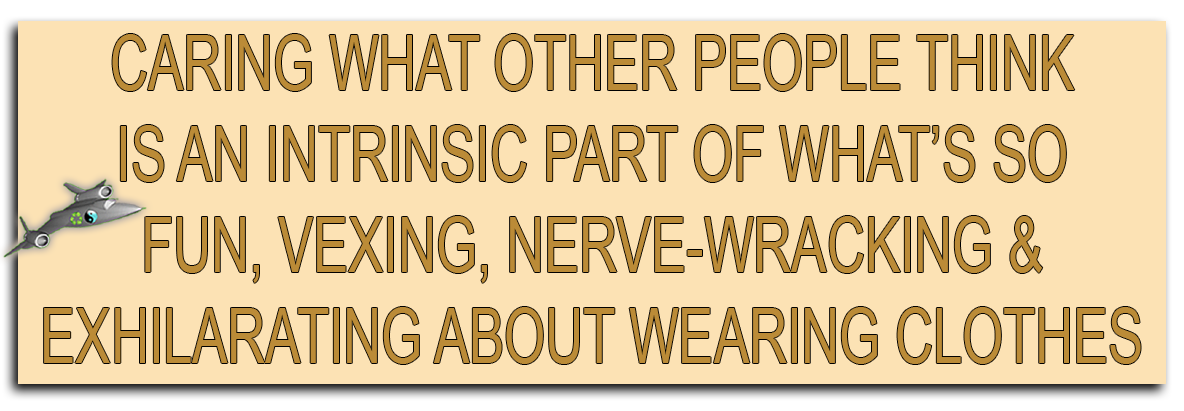Yes you should care what other people think
But "care smarter"
Welcome to Blackbird Spyplane
Our Home Goods Report, full of things to enliven the place you live, and stores where you can find them, is here.
Mach 3+ city intel for traveling the entire planet is here.
The B.L.I.S.S. List — a handy rundown of Beautiful Life-Improving Spyplane Staples, from incense to sweatpants to underwear — is here.
Today we’re talking about other people’s opinions. Can’t live with them, can’t live without them??
This is an issue of enormous importance when it comes not only to wearing clothes but to living life generally.
So it’s no surprise that two Spyfriends recently wrote in asking for guidance re: The Judgment of Others.
1. “How does one stop caring about what other people think?” — andrewbuck3t
This is a question that basically everyone asks themselves at some point / constantly. And yet, I’d argue, it’s fundamentally misguided.
The question is common because it’s ultimately about building up your self-confidence and 🧑🍳 cooking freely 🧑🍳 in the face of haters who s**t on you, ignoramuses who are confused by you, and/or onlookers whose approval you desire but, sadly, they could not give less of a f**k about you and don’t notice you at all.
Along these lines, the simplest answer is that you should work like a Cool Gymnast to develop what we are officially naming your “Ho, I Trust in My Enormous Swag (H.I.T.I.M.E.S.)” core strength.
Much like literal core strength, H.I.T.I.M.E.S. core strength will make you stand taller and make you more resistant to getting knocked off your bearings by the forces of other people’s disapproval, bewilderment and / or crushing lack of interest. E.g., “It’s 2025 and the silverback millennials at this party are snickering at me because they think these pants I’m wearing are too big?? Nice try ho — I trust in my enormous swag, and you are in fact the one looking nervous in those stretch-fit skinny chinos baby.”
To build your H.I.T.I.M.E.S. muscles, try things out, make mistakes, refine accordingly, stretch yourself here, retreat there, do lots of cool things and pursue lots of cool interests besides clothes, and — crucially — get better at deciding which reactions to ignore and which reactions to listen to.
That last part brings us to why I think the framing of the question itself is fundamentally off, though: I don’t think you ever want to reach some state where you stop caring about all opinions.
Because caring what other people think is, ultimately, an intrinsic part of what’s so cool, fun, vexing, nerve-wracking and exhilarating about wearing clothes!
We’ve said a version of this before. If you care about clothes — which presumably applies to ~100% of Spy Nation — then regardless of how free-thinking you are, you never get dressed for you and you only, in a vacuum.
No! If you care about clothes, then on an irreducible level you care about what other people think. That’s the deal. There is always a social dimension to putting s**t on, much the same way there is always a social dimension to writing music or making films: You think Martin Scorsese — a man with decades’ worth of directorial H.I.T.I.M.E.S. core strength — isn’t showing a 4-hour cut of The Irishman to a trusted circle to get a sense of where it isn’t quite hitting??
The real mistake lies in thinking that caring about other people’s opinions is necessarily a bad thing — an indication of weak moral fiber or wobbly personal integrity, etc.
And sure, getting dressed, like any mode of creativity, is something you could theoretically engage in all by yourself, in private, walled off from the thoughts and reactions of others. But A) that sounds like a bummer and possibly sociopathic, and B) it would not be the fullest, truest, most alive version of that pursuit.
It would be an incomplete circuit. A comedian muttering jokes to himself inside a coffin. Antisocial lunacy masquerading as “independent style.”
And that brings us to —
2. “My friend: I have a sweater I rarely wear, as I feel it’s a bit oversized, in a strange way. But whenever I throw it on, I get compliments on both the sweater and the fit. How do you deal with what you might call ‘fit dysmorphia,’ and how do you balance being true to your own vision with honoring the praise of trusted confidants?” — respectfulcoolguy
We’ve written before about Fit Dysmorphia — i.e., how we are often unreliable narrators of how we look in clothes — in the context of how If your pants are too big, you should wear bigger pants, because There’s No Such Thing As Too-Big Pants.
The insights in that sletter apply to how clothes fit across the board.
But where my mind went while contemplating respectfulcoolguy’s question above was to “How to Be Good,” a 2011 New Yorker profile of the moral philosopher Derek Parfit by Larissa MacFarquhar.
I haven’t read the profile in full since it came out. But the part that’s stuck with me is Parfit’s argument, paraphrased early on, that we exist, to a meaningful degree, in other people’s thoughts of us. “Personal identity is not what matters,” MacFarquhar writes. Our selves are constructed by us in collaboration with other people.
Parfit suggests you think about how your identity will transcend the fact of your physical death, lingering and living on in the thoughts of other people whose lives intersected with yours, in “memories that connect with [your] memories, thoughts that connect with [your] thoughts, actions taken that connect with [your] intentions, [all of which] will persist after [you are] gone, just inside different bodies,” MacFarquhar writes.
Ipso facto, your identity already exists in this distributed, de-centralized, socially constructed way while you are alive. And ipso facto one step further, your swag, too, is a combination of what you do and of other people’s reactions to, perceptions of, and thoughts about you.
And while we don’t need to give all these people equal weight, we should absolutely give weight to the thoughts of loved ones, good friends, and “trusted confidants,” as respectfulcoolguy puts it.
So if a bunch of those people tell you that the big sweater looks good on you, in a way that does not immediately conform to your own current self-image, why not trust fall into their arms and test your borders? Wear the s**t, wear it some more, and see if the way you see it and how you feel in it changes over time.
You might ultimately decide that your friends’ positive reactions are outweighed by your own negative ones. That’s fine.
But dismissing and ignoring their reactions out of hand would be not only to deny a gift. You’d risk denying a truth about yourself that you need other people to help you see.
We don’t run ads, we refuse gifts, and we don’t use affiliate links when we cover new clothes. We do use them for one-off secondhand gems we find on eBay and Etsy, plus books on the independent bookseller Bookshop. We laid out our position on affiliate links and spon here.







Closest I can imagine to getting dressed for oneself alone is the Dog Walking Fit. It’s really where I just slap on whatever feels right and will work for the job, since aesthetics are low on the list of priorities in how I engage with the people on my block. Whatever coat’s hanging by the door with whatever shoe I don’t need to tie, etc. Akin to the “shoveling the driveway” fit that good stylists seem to love. It’s a fun sub field of fitcraft to think of “least external cases” like this
Silverback millennials. That's exquisite.
Getting older truly does help with the first question. I can't pinpoint when or why but at some point the largely invisible, and possibly made up, people in my head stopped mattering. It's not about shutting yourself off from strangers but imagining good people and good reactions to your expression. It's a rewarding way to live and I wish it upon others.